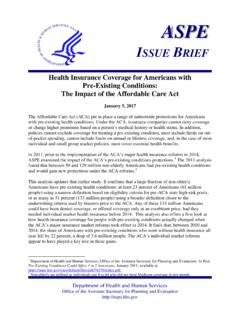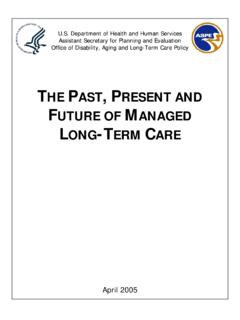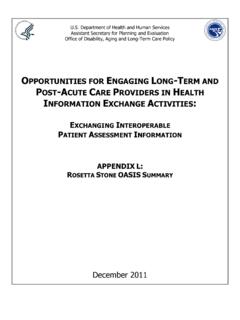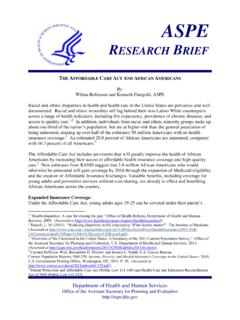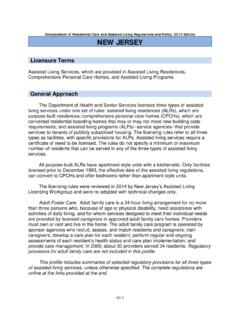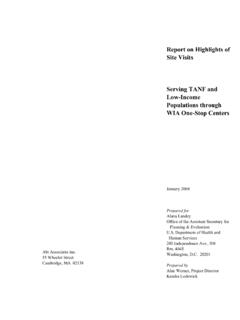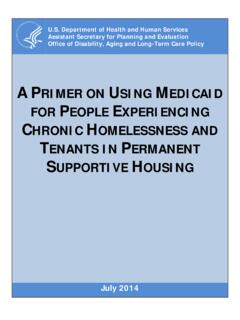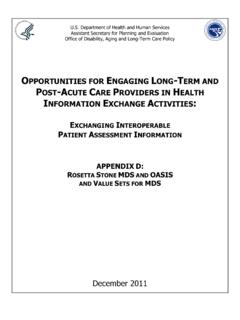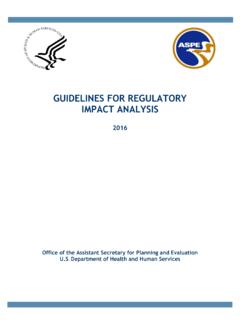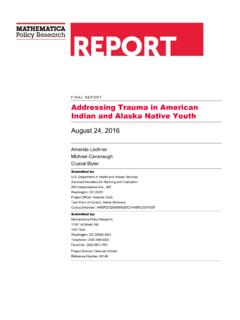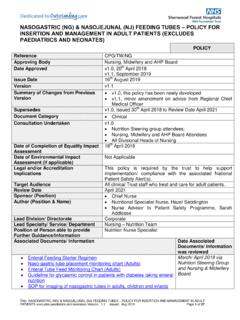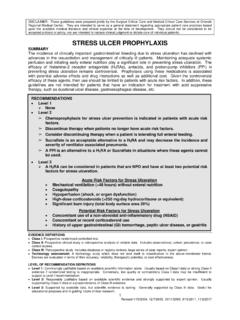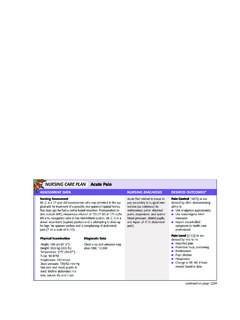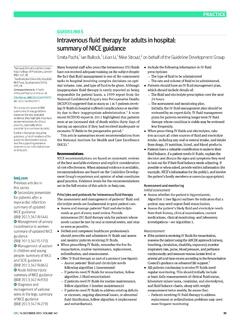Transcription of Residential Care/Assisted Living Compendium: Florida
1 FL-1 Compendium of Residential care and Assisted Living Regulations and Policy: 2015 Edition Florida Licensure Terms Assisted Living Facilities General Approach The state views assisted Living facilities (ALFs) as an important part of the continuum of its long-term care system, to be operated and regulated as Residential environments with supportive services and not as medical or nursing facilities. The Bureau of Health Facility Regulation licenses several types of ALFs, which can range in size from one resident to several hundred. Facilities are licensed to provide routine personal care services under a standard license or more specific services under the authority of specialty licenses. ALFs meeting the requirements for a standard license may also qualify for specialty licenses. The purpose of specialty licenses is to allow individuals to age in place in familiar surroundings that can adequately and safely meet their continuing health care needs.
2 Specialty licenses include limited nursing services (LNS), extended congregate care (ECC), and limited mental health (LMH) services. To obtain a specialty license, facilities must meet additional requirements, including those related to staffing and staff training. Adult Foster care . An adult family care home (AFCH) is a licensed, full-time, family-type Living arrangement in a private home, under which individuals who own or rent a home provide room, board, and personal care on a 24-hour basis to no more than five disabled adults or frail elders who are not relatives. Each AFCH must designate at least one licensed space for a resident receiving an optional state supplement (OSS). AFCH operators must live in the home; if they do not, the home must be licensed as an ALF. If an AFCH provides room, board, and personal services for only 1-2 adults who do not receive an OSS, it does not have to be licensed. Regulatory provisions for adult family homes are not included in this profile but a link to the provisions can found at the end.
3 Unless noted as a provision for one of the specialty licenses, this profile includes summaries of selected regulatory provisions for ALFs with a standard license. The complete regulations are online at the links provided at the end. FL-2 Definitions Assisted Living facility means any building or buildings, section or distinct part of a building, private home, boarding home, home for the aged, or other Residential facility, which undertakes through its ownership or management to provide housing, meals, and one or more personal services ( , assistance with activities of daily Living (ADLs) and self-administered medication) for a period exceeding 24 hours to one or more adults who are not relatives of the owner or administrator. An ALF can have a standard license or a specialty license as defined below. Standard means a facility licensed to provide housing, meals, and one or more personal care services for a period exceeding 24 hours.
4 Personal care services include direct physical assistance with or supervision of a resident s ADLs and the self-administration of medication and similar services. The facility may employ or contract with licensed persons to administer medication and perform other nursing tasks, such as taking vital signs, managing individual weekly pill organizers for residents who self-administer medication, giving pre-packaged enemas ordered by the physician, and observing residents. Limited nursing services means a facility licensed to provide any of the services under a standard license and additional LMH specified in rules, which include: conducting passive range of motion exercises; applying ice caps or collars and heat; cutting toenails of diabetic residents or residents with a documented circulatory problem, if approved in writing by the resident s health care provider; performing ear and eye irrigations; conducting a urine dipstick test; replacing established self-maintained in-dwelling catheter or performing intermittent urinary catheterizations; applying and changing routine dressings that do not require packing or irrigation; caring for Stage II pressure sores; conducting nursing assessments if conducted by, or under the direct supervision of, a registered nurse (RN).
5 And providing any nursing service permitted within the scope of the nurse s license, including 24-hour supervision, for hospice patients. Extended congregate care means a facility licensed to provide any of the services under a standard license and LNS license, including any nursing service permitted within the scope of the nurse s license consistent with ALF residency requirements and the facility s written policy and procedures. A facility with this type of license enables residents to age in place in a Residential environment despite mental or physical limitations that might otherwise disqualify them from residency under a standard or LNS license. This definition creates a higher level of care in assisted Living . Limited Mental Health. A facility licensed to provide any of the services under a standard license must obtain an LMH license to serve three or more residents who receive Social Security Disability Insurance or Supplemental Security Income (SSI) benefits due to a mental disorder, and who also receive a state SSI supplement--called the OSS.
6 The facility must meet additional requirements, including the development of a community Living support plan with the mental health resident and a case manager, FL-3 which specifies the resident s needs that must be met to enable the resident to live in an ALF and the community. Resident Agreements The resident contract must contain a list of specific services, supplies, and accommodations to be provided--including those provided under any specialty license; the daily, weekly or monthly rate and the notice policy for rate increases; additional services available and their cost; residents rights, duties and obligations; refund policies and procedures; the bed hold policy; a statement of the organization s religious affiliation and related requirements, if any; and discharge policies and procedures. Disclosure Provisions A facility that advertises that it provides special care for persons who have Alzheimer s disease or other dementias must disclose in its advertisements or in a separate document those services that distinguish the care as being especially applicable to, or suitable for, such persons.
7 The facility must give a copy of all such advertisements or a copy of the document to each person who requests information about programs and services for persons with Alzheimer s disease or other dementias offered by the facility and must maintain a copy of all such advertisements and documents in its records. The licensing agency examines all such advertisements and documents in the facility s records as part of the license renewal procedure. Admission and Retention Policy Facilities must determine the appropriateness of admission and retention based on the ability of the facility to meet an individual s needs and preferences. To be admitted and retained, an individual must be capable of performing ADLs, including transfers, with supervision or assistance; not require 24-hour nursing supervision; be free of Stage II, III, or IV pressure sores; be able to participate in social and leisure activities; be ambulatory; and not display violent behavior or be a danger to self or others.
8 Terminally ill residents may continue to reside in any ALF if the arrangement is mutually agreeable to the resident and the facility, additional care is rendered through a licensed hospice, and the resident is under the care of a physician who agrees that the resident s physical needs are being met. In standard and LNS facilities, people who are bedridden more than 7 days or develop a need for 24-hour nursing supervision may not be retained. Residents with Stage II pressure sores may remain if the facility has a limited nursing license or FL-4 resident contracts with a home health agency or RN. Residents in ECC facilities may not be retained if they are bedridden for more than 14 days. EEC facilities must promote aging in place by determining the appropriateness of continued residency based on a comprehensive review of the resident s physical and functional status; the ability of the facility, family members, friends, or any other pertinent individuals or agencies to provide the care and services required; and documentation that a written service plan consistent with facility policy has been developed and implemented to ensure that the resident s needs and preferences are addressed.
9 Services Facilities provide different services depending on their licensure types. Standard facilities provide personal care services and assistance with self-administration of medications. Facilities with an LNS license can provide additional nursing services specified in regulations, such as applying and changing routine dressings that do not require packing or irrigation, but are for abrasions, skin tears, and closed surgical wounds; caring for Stage II pressure sores; catheter, colostomy, and ileostomy care and maintenance; caring for casts, braces, and splints; conducting nursing assessments if conducted by an RN or under the direct supervision of an RN; and providing any nursing service permitted under the facility s license and total help with ADLs for residents admitted to hospice. Facilities with an ECC license can provide more extensive ADL assistance and additional nursing services if required by the resident s service plan: total help with bathing, dressing, grooming and toileting; nursing assessments conducted more frequently than monthly; measurement and recording of basic vital functions and weight; dietary management, including provision of special diets, monitoring nutrition, and observing the resident s food and fluid intake and output; assistance with self-administered medications; or the administration of medications and treatments pursuant to a health care provider s order.
10 ECC facilities may not provide oral or nasopharyngeal suctioning, assistance with nasogastric tube feeding, monitoring of blood gasses, intermittent positive pressure breathing therapy, skilled rehabilitative services; or treatment of surgical incisions, unless the surgical incision and the condition which caused it have been stabilized and a plan of care developed. FL-5 Service Planning Within 60 days prior to admission, but no later than 30 days after admission, residents must be examined by a physician or advanced RN practitioner who must provide the administrator with a medical examination report. Licensed nurses who are employed by or under contract with a facility must, on a routine basis or at least monthly, perform a nursing assessment of the residents for whom they are providing nursing services ordered by a physician (except administration of medication), and must document such assessment, including any substantial changes in a resident s status which may necessitate relocation to a nursing home, hospital, or specialized health care facility.
